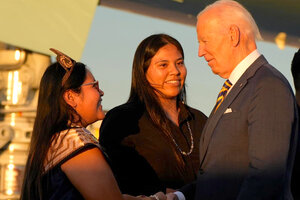Thanksgiving as forgiving
An official apology to Native Americans – and a response of forgiveness – can help create the possibility of a mutual feeling of justice.

President Joe Biden greets members of the Gila River Indian Community at the airport in Phoenix, Ariz., Oct. 24.
AP
For many Native Americans, Thanksgiving is often seen as a day of mourning – a reminder of what their peoples lost at the hands of European settlers and their descendants. This year, however, that dark history saw a blush of light. On Oct. 25, President Joe Biden stood before the Gila River Indian Community in Arizona and apologized on behalf of the federal government for the forced removal of Native American children to assimilation schools.
Coming at the start of a season in which Americans count their blessings among family, friends, and strangers, that gesture of national atonement fits into a shift in recent years toward a broader reading of past
abuses of Indigenous people.
“We do not erase history; we make history,” Mr. Biden said. “We learn from history, and we remember so we can heal as a nation.”
Apologies often open a pathway to reconciliation. Any remorse, however, even if it is only official, relies ultimately on a response of forgiveness in order to bring a mutual feeling of justice.
“Instead of looking at the apology for what it isn’t,” wrote Anton Treuer, a professor of Ojibwe at Bemidji State University in Minnesota, “we should look at the apology for what it is – an opportunity to set a new tone for our country and start a healing journey.”
“The only way through this is together,” he wrote in The Minnesota Star Tribune.
Under the Indian Civilization Fund Act of 1819, hundreds of thousands of children were taken from their families and scattered throughout government-funded schools. Most were deprived of their names, their languages, and their families. Many died because of abuse. Much of that policy endured into the 1970s.
Several initiatives aim to repair the damage. Bills in Congress, for example, would establish a commission to forge a common narrative through the testimonies of separated families. A Senate bill requires that members of the panel “be persons of recognized integrity and empathy” with an understanding of Native American approaches to healing and reconciliation.
The legislation coincides with a two-year investigation by the U.S. Department of the Interior into abuses under the school policy and a “road to healing” listening tour, which completed last year, through a dozen Native American communities.
Together with the presidential apology, the combination of acknowledgment and accountability may do more than shape a new narrative of past harms or lead to material forms of restitution.
A novel college experiment shows how. Last year, the University of Mary Hardin-Baylor in Texas restored a long-lapsed tradition of making Thanksgiving a day of forgiveness. Every student was required to offer a gesture of reconciliation before sitting down to the holiday meal. The effort was as transformative as it was challenging.
“I love the concept of intentionally forgiving people right before Thanksgiving so you can be thankful with a grateful and unburdened heart,” recalled Danielle Kenne, then a senior, in a recollection published by the university in June. “I never really considered how forgiving others could affect my ability to be truly thankful, and it made me want to spend time in prayer about forgiveness before Thanksgiving.”

